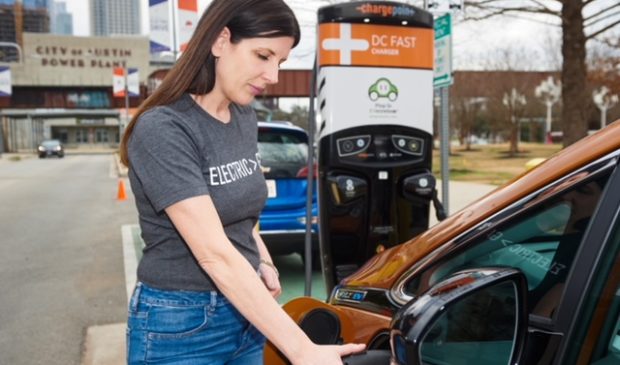City on pace for goal of 330 electrified vehicles by close of 2020
Monday, November 25, 2019 by
Chad Swiatecki The city is on pace to have 330 electric vehicles in its fleet by the end of 2020, meeting a 2016 goal set by City Council that will make nearly 5 percent of the city’s 6,700 vehicle fleet composed of EVs.
Representatives from Austin Energy and the city’s Fleet Services Division gave an update at last week’s meeting of the Electric Utility Commission on the move toward electrified vehicles, which is expected to save the city $3.5 million over a 10-year period.
Rick Harland, assistant director of the fleet division, said the city purchased 71 EVs this year to bring the total number in the fleet to 201. The division expects to meet or surpass the 330 goal next year by consulting with city department heads on their need for new or replacement vehicles and pushing the city’s goal for electrification.
Harland said the city is trying to lead in a move away from vehicles with internal combustion engines, with EV sales increasing and expected to put added pressure on utility providers and related infrastructure for charging stations. He said the city currently has 33 charging stations and is looking to increase that number to 101 by the end of the year to prevent bottlenecks in charging vehicles that typically require 20 minutes to receive adequate power for daily use.
“Our strategy is to do the right thing today to try to be prepared for tomorrow. We think this is where this whole thing is going and in 10 years we believe that EVs will represent 25 percent of all vehicle sales,” he said. “It’s a big problem for a lot of power companies and how they’re going to manage this in the future.”
Well-known models such as the Toyota Prius and Chevrolet Bolt and other light-duty sedans make up a large portion of the city’s EV stock, with manufacturers slowly making pickup trucks and other models available in electric formats.
Harland and Karl Popham, manager of EVs and emerging technologies for Austin Energy, said wider availability of pickups and eventually heavy-duty trucks will allow the utility to increase its move away from fossil fuel vehicles, in large part because the utility’s major vehicle needs fall outside of the light-duty category.
Commissioner David Tuttle responded by asking what the city is doing to push vehicle manufacturers to make more heavy-duty models available with electric engines.
“Is there anything that could be done to put soft orders in to make sure they understand and invest to get more competition in the pickup space and encourage them to electrify those powertrains?” he said. “There may be some up-fitter requirements and if they come up with something, would it be ready for you to buy for your fleet? Is there something else you need and has that been communicated so as soon as it’s available you can electrify that part of your fleet?”
Harland said the city is part of a collective of Texas municipalities that work together to purchase in groups when possible, but another partnership with 19 small and large cities across the country has been more effective in reducing purchase prices for EVs while lobbying manufacturers for wider availability.
“We’ve got a problem with the heavy-duty truck folks; they want us to give them a (purchase order) and then they will build the truck,” he said. “We want to see the truck before we give them a PO, so there’s a little bit of a back-and-forth between us and them because frankly we’d like to see the truck first or see something demonstrated before we dive into it, but we may have to take a little bit of risk in that area to push the envelope a little bit further.”
Photo courtesy of Austin Energy.
The Austin Monitor’s work is made possible by donations from the community. Though our reporting covers donors from time to time, we are careful to keep business and editorial efforts separate while maintaining transparency. A complete list of donors is available here, and our code of ethics is explained here.
You're a community leader
And we’re honored you look to us for serious, in-depth news. You know a strong community needs local and dedicated watchdog reporting. We’re here for you and that won’t change. Now will you take the powerful next step and support our nonprofit news organization?









